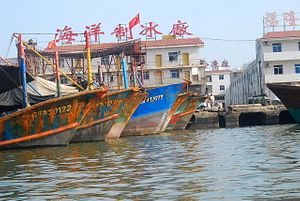Recent reports claimed that a Chinese fishing fleet was being monitored by satellite systems 160 miles from the biodiversity-rich Galapagos Islands, a UNESCO Heritage Site made famous as a showcase of evolution in Charles Darwin’s studies. The Ecuadorian Navy noted that 260 Chinese vessels were located beyond the exclusive economic zone, along a major fishing migration route between the Galapagos Islands and the Ecuadorian coast. In 2017 and 2019, environmentalists also sounded the alarm after a Chinese fishing fleet approached the area. The Galapagos archipelago, located in the Pacific Ocean, is home to rare flora and fauna — marine iguanas, flightless cormorants, giant tortoises, huge cacti, endemic trees, and many subspecies of mockingbirds and finches. The islands are an ecological tourism site with unparalleled biodiversity, starting from the sea bottom. Several foreign organizations, trusts, foundations help fund projects to conserve the endemic species in its national parks and protected areas. Overfishing would jeopardize this protected area.
In other parts of the Pacific, Chinese fishing vessels have caused tensions on account of incursions in areas under the exclusive jurisdiction of other states; accusations of illegal, unregulated, and unreported (IUU) fishing; and repeated harassment of small Vietnamese, Philippine, and other fishing vessels in the South China Sea, especially near disputed territories, where the fish catch has been steadily decreasing. These fishing fleets are more properly understood as China’s maritime militias, displaying China’s firm resolve to maintain its presence in the South China Sea, even in areas where other coastal states have exclusive jurisdiction according to the UN Convention on the Law of the Sea (UNCLOS), which China and neighboring states ratified. These vessels are used to assert a stake in the disputed areas of the South China Sea and are often accused of IUU fishing.
UNCLOS emphasizes that states have the obligation to protect and preserve the marine environment. The Convention on Biological Diversity complements UNCLOS in areas beyond national jurisdiction. But China’s fishing fleet has proved destructive in areas within and beyond its national jurisdiction.
Overfishing is not the only environmental problem posed by Chinese vessels. In the Philippines, small-scale fisherfolk, the victims of Chinese incursions, recently condemned the presence of Chinese-registered vessel MV Zhong Hai 69 Alfa, which had run aground on a marine protected area in Zambales, Luzon Island. A fisher group in that area, Pamalakaya, complained that since the arrival of Chinese dredging and cargo vessels, the fish catch has dwindled. In other Philippine coastal communities, fisherfolk likewise complain about Chinese-manned dredging and quarrying vessels, whose activities aggravate erosion and cause flooding, as the Philippine archipelago is often besieged by strong, destructive typhoons that render thousands homeless.
Another incident involved a Chinese ship quarrying limestone in Bohol province. Quarrying results in dust emissions that affect air quality, alter groundwater flow, and affect ecology. In March, Philippine fisherfolk also denounced the presence of Chinese dredging and quarrying vessels in the 7,000 hectare Masinloc-Oyon Bay marine protected area of Zambales. The vessels have been there for nearly a year. With no resources to rehabilitate damaged ecosystems, Chinese ships have caused anger among many Filipinos. Adding insult to injury, these Chinese dredgers fetch materials to maintain artificial islands in the South China Sea. The islands then serve as military and logistics installations in aid of Chinese hegemony in the region.
Philippine Defense Secretary Delfin Lorenzana has expressed alarm over the proliferation of Chinese vessels around Philippine territory and disputed territories, stressing the power of Philippine authorities to enforce compliance. But to the contrary, President Rodrigo Duterte heaps praise on Chinese President Xi Jinping and China, despite the Philippines being a longtime defense ally of the United States.
In September last year, Chinese personnel were arrested for engaging in illegal dredging operations without visas and work permits. Under fire for Duterte’s pro-China policy, the presidential spokesman quickly shifted responsibility to the local government unit to remove the foreign vessel. While the removal of a ship that has run aground tones down the anger of fisherfolk whose livelihoods are affected, it does not alleviate negative impacts on marine life nor prevent future episodes. In fact, Chinese vessels have kept coming.
The damage to the marine environment is not limited to territorial waters and exclusive economic zones of other states. In the high seas, dredging to build Chinese artificial islands resulted in the destruction of coral reefs, the habitats of rare marine species. An expedition of marine biologists from the University of the Philippines uncovered such destruction and aired pictures and videos on social media. Previously, the United States paid damages to the Philippines when its ship accidentally run aground on one coral reef. But calls for China to protect the environment have fallen on deaf ears. The lack of an integrated ocean management system in the area that identifies protected areas in the oceans is mainly due to China’s militarization of the South China Sea.
Meantime, China’s artificial islands, built from dredged and quarried material, are being eroded by strong currents at sea. The damage to the marine ecosystem from China’s maritime power trip cannot be quantified. The livelihoods of small fisherfolk are suffering as there are fewer and fewer fish to catch.
Paula Knack is a former assistant secretary for lands and legislative affairs of the Philippine Department of Environment and Natural Resources. She holds a Master’s in Science in Sustainable Resource Management from Technische Universitat Munchen (Technical University Munich) in Germany.

































